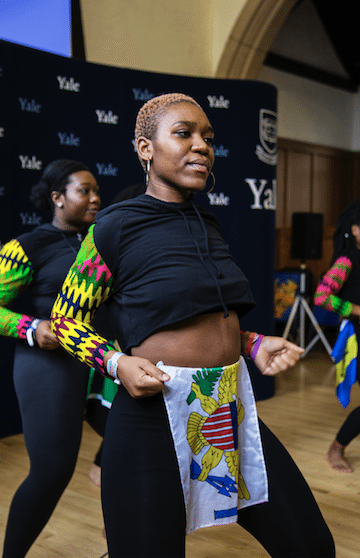
AFRICA SALON, a University-wide celebration of African arts and culture, was held on campus last weekend, bringing together artists, activists and scholars to discuss contemporary artistry from across the continent.
The organizers of the annual event, which the Yale Africa Initiative first hosted in 2015, aimed to highlight contemporary visual art, poetry, music, fashion, dance, media and cuisine from around Africa. The festival featured artwork, performances and discussions by professional artists from around the world and by student artists from Yale and other local universities. Events took place April 21 and 22. The Afro-American Cultural Center served as the central venue.
“With AFRICA SALON, the goal is really to fill a space that has been left vacant by the University — and by universities like this around the country — in terms of not only thinking about Africa as a more complex place in a wide range of subjects, but specifically in the arts, in modern, contemporary arts,” said Dianne Lake ’16, curator of this year’s festival and a Woodbridge Fellow in the Office of International Affairs. “When academic settings think about the continent, it has a lot to do with their research and development work, but in terms of thinking about music and dance and visual art, those forms of creativity are not necessarily given as much academic merit, particularly modern art, because the focus is usually traditional African arts and culture.”
Friday’s schedule included a discussion and film screening with Nosarieme Garrick, the executive producer and director of the documentary series “MY AFRICA IS”; a panel discussion featuring Anakwa Dwamena, a writer for The New Yorker and the group blog Africa is a Country; and a reading with poet Safia Elhillo, winner of the 2016 Sillerman First Book Prize for African Poets.
Saturday attendees enjoyed, among other events, a taste presentation that featured foods from local African eateries, including Lalibela Ethiopian Restaurant and Kasbah Garden Cafe; an African dance showcase that included groups from Yale, the University of Connecticut and Eastern Connecticut State University; and a music workshop with Cosmic Homies, a Kenya-based group.
Though last year’s AFRICA SALON took place over a full week, this year’s festival returned to the two-day format of the original event.
“The second year, it was a little bit more spread out over the course of the week, to have more of the feel of a festival in that sense,” Lake said. “This year, we’ve condensed it again because we really think that people can get the most out of it if the events are more concentrated.”
Lake also said that she focused on making this year’s events more interactive than those in the past. She said she wanted attendees to be able to engage actively with the artwork being discussed.
Attendees were able to do so at events such as the dance showcase, during which student leaders from Dzana, Yale’s Afrobeats dance group, led a crowd of about 50 through several African steps.
Student artists who participated in AFRICA SALON were also able to engage, through their own art, with the discussions about the continent. Among them was Daad Sharfi ’17, one of two student poets who opened the poetry reading.
“The poem I performed, funnily enough, was entitled ‘Diaspora’ and revealed the internal conflict and tension embedded in embodying hyphenated identities like my own,” said Sharfi, who is Sudanese-American. “It arose out of years of having to navigate spaces as a black Arab and African woman and neither entirely nor neatly fitting into any of those categories alone because I exist at the intersection of them all.”
Attendees also took advantage of the opportunity to engage with contemporary African arts. Jay Pittman ’19, who attended the concert given by Cosmic Homies and Brooklyn-based OSHUN on Friday night, said he enjoyed the concert’s “magnetic” atmosphere. Pittman said he thinks AFRICA SALON does a good job of combining academia with entertainment, which he said likely increases its reach among Yalies.
Lake said she hopes students can continue to get even more involved as AFRICA SALON matures. Because the festival takes place under the umbrella of the Yale Africa Initiative, most of the organizing is done by University employees. Lake said that she hopes that, in future years,f students will be able to work with AFRICA SALON in ways beyond just contributing their artwork.
The Yale Africa Initiative began in 2013.







